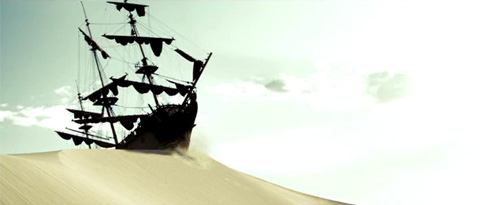Pirates of the Imagination
Sunday, November 18th, 2012 • Movies
I just get such a kick out of the Pirates trilogy (the Gore Verbinski movies; not the fool’s-gold fourth entry that I won’t even see). It’s such an aesthetic triumph; it’s such delightfully arty populism. I love how the writers “reverse engineered a trilogy” by finding inconsequential, throwaway elements in the first movie (Captain Jack Sparrow’s compass “that does not point north;” the ad-libbed Johnny Depp line about the native tribe who “made me their Chief”) and using them to extrapolate an overarching story that goes all the way to Shanghai, a neo-Homeric underworld (“Davy Jones’ locker,” where the rocks ambulate like crabs) and a thematic concept of the New World and the passing of the last of the post-Enlightenment, “Age of Exploration” elements out of history. I love the hyperrealist, storybook-tinted photography and the groundbreaking CGI effects (that put ILM back on the map and lined them up for Iron Man, Star Trek and more of the eye-popping work they’ve done in their current “digital baroque” period). I love how the British bad guys in their powdered wigs and the supernatural bad guys agree to work together. I love how Depp manages to keep his ridiculous, wonderful (Oscar-nominated) schtick going perfectly through the saga (which reminds me of how Christopher Lloyd was reluctant to do the Back to the Future sequels because he was afraid he “couldn’t reproduce the energy levels” of the first one). I love the contrivances by which Elizabeth Swann remains an important character throughout (and is never reduced to ornamentation or trophy-status). I love how every single minor character in the first movie is brought back and utilized to the utmost in the sequels (like how James Norrington, the man Elizabeth spurned, is re-discovered in Tortuga, drinking and depressed, and eventually sacrifices himself for her). I love the Keith Richards cameo. I love the carved-gold title and the copperplate typography (with the letters reflected in the sapphire ocean waves). I love the textures; the seaweed and driftwood and ground-glass and grime, the sand and dirt and canvas and linen, the sea foam and rum bottles and lantern oil and candles (you can nearly smell all of it, and the briny salt-water and Caribbean wind). I love the crazy, acid-trip plotting, and the psychedelic, hallucinogenic abstractions and surrealism that can be found “at world’s end.” I love how they just spun all of the above out of nothing at all; just looked at that creaky old amusement park ride and then put their imaginative pedals to the metal, expanding it into an enormous, mythologically and historically dense fantasy with a whimsical, melancholy tone halfway between the dystopian gravitas of the Matrix world and the retro-toned pop art of the “Indiana Jones” saga. They deserved the fortune they made.
